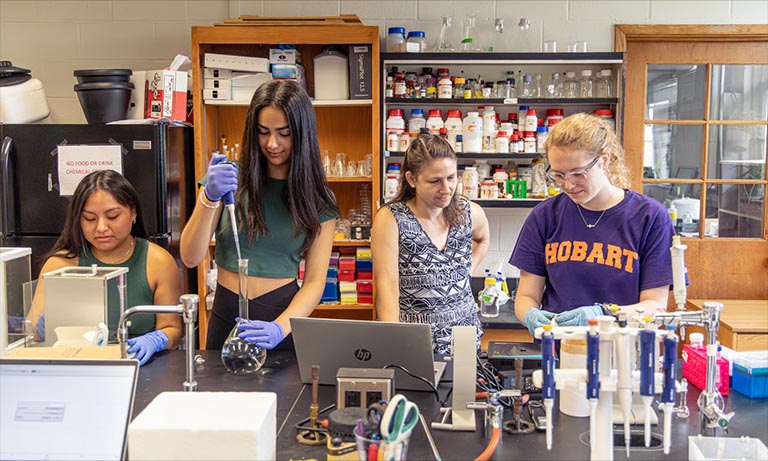
HWS News
15 August 2024 • Research • STEM Turning on Enzymes By Andrew Wickenden '09
With Professor of Chemistry Kristin Slade, student researchers investigate one enzyme’s relationship with certain types of cancers.
Malate dehydrogenase (MDH) is a critical enzyme in the citric acid cycle, which is central to the human metabolic system. The inability to turn off this enzyme has been linked to certain types of cancers.
To better understand this relationship, Professor of Chemistry Kristin Slade and Camila Garcia ’24, Lina Hassini ’26 and Genevieve Larkin ’27 have spent the summer making and purifying mutants of MDH with and without the chemical on/off switch that regulates the enzyme. Through this work, they are studying how these mutants perform their metabolic function under different conditions.
Working independently within the larger research group, each student has explored how the enzyme responds in different pH conditions.
Hassini, a pre-med biology major, learned about the citric acid cycle during a cell biology course and now has a chance to explore the process in more depth. As she has systematically tested different inhibitors to see which is effective on MDH, she has been applying “what I learned in class…adapted to my own research,” she says.
Understanding both the lab process as well as the underlying science has been “a big element and a very important to me… I have to really grasp what I’m doing in order to move forward with my research,” she says.
Learn more about research at HWS.
Top: Professor of Chemistry Kristin Slade and her research students Camila Garcia '24, Lina Hassini '26 and Genevieve Larkin '27 study malate dehydrogenase (MDH), a critical enzyme in the citric acid cycle. In the lab, they purify the enzyme to observe its kinetics under different conditions.



